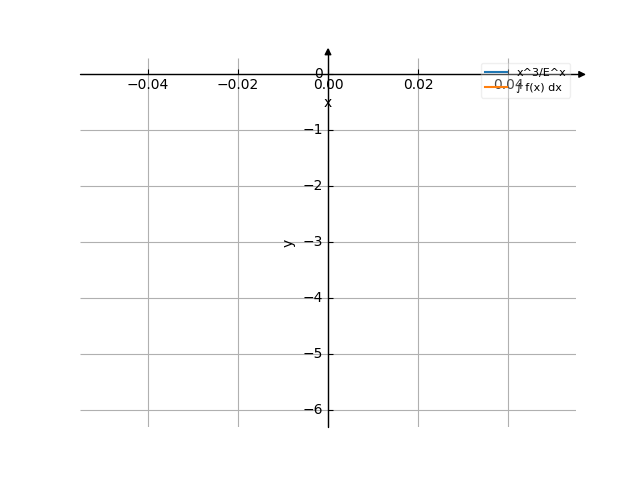Integral of e^(-x)*x^3 dx
The solution
oo / | | -x 3 | e *x dx | / 0
Integral(x^3/E^x, (x, 0, oo))
-
Use integration by parts:
Let and let .
Then .
To find :
-
There are multiple ways to do this integral.
Method #1
-
Let .
Then let and substitute :
-
The integral of a constant times a function is the constant times the integral of the function:
-
The integral of the exponential function is itself.
So, the result is:
-
Now substitute back in:
-
Method #2
-
Let .
Then let and substitute :
-
The integral of a constant times a function is the constant times the integral of the function:
-
The integral of a constant is the constant times the variable of integration:
So, the result is:
-
Now substitute back in:
-
-
Now evaluate the sub-integral.
-
-
Use integration by parts:
Let and let .
Then .
To find :
-
Let .
Then let and substitute :
-
The integral of a constant times a function is the constant times the integral of the function:
-
The integral of the exponential function is itself.
So, the result is:
-
Now substitute back in:
-
Now evaluate the sub-integral.
-
-
Use integration by parts:
Let and let .
Then .
To find :
-
Let .
Then let and substitute :
-
The integral of a constant times a function is the constant times the integral of the function:
-
The integral of the exponential function is itself.
So, the result is:
-
Now substitute back in:
-
Now evaluate the sub-integral.
-
-
The integral of a constant times a function is the constant times the integral of the function:
-
Let .
Then let and substitute :
-
The integral of a constant times a function is the constant times the integral of the function:
-
The integral of the exponential function is itself.
So, the result is:
-
Now substitute back in:
-
So, the result is:
-
-
Now simplify:
-
Add the constant of integration:
The answer is:
/ | | -x 3 -x 3 -x -x 2 -x | e *x dx = C - 6*e - x *e - 6*x*e - 3*x *e | /

Use the examples entering the upper and lower limits of integration.

![Find the integral of y = f(x) = e^(-x)*x³ dx (e to the power of (minus x) multiply by x cubed) - with detailed solution [THERE'S THE ANSWER!] e^(-x)*x^3](/media/krcore-image-pods/176/hash/indefinite/0/2c/6e42c28df6cfc415baabf8b13c633.png)
 Integral of x*ln(x)
Integral of x*ln(x)
 Integral of 8x
Integral of 8x
 Integral of e^(-x)*x^3
Integral of e^(-x)*x^3
 e^(-x)*x^3
e^(-x)*x^3